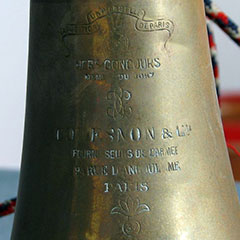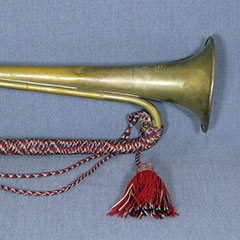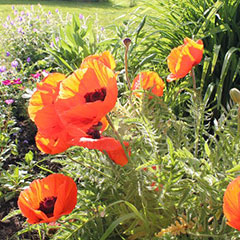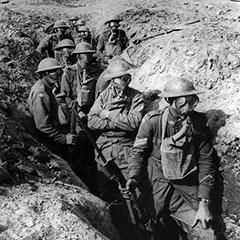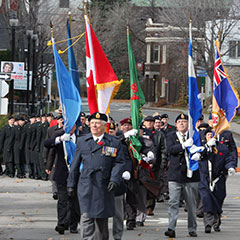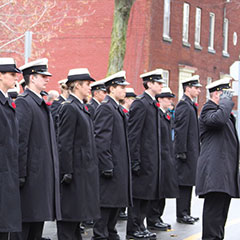Remembrance Day
On November 11th each year, everywhere in Europe and in the Commonwealth countries, including Canada, people observe the Remembrance Day. The holiday initially commemorated the end of the First World War (1914-1918) and, more specifically, the Armistice signed on the eleventh hour of the eleventh day of the eleventh month of 1918, by French representative Marshal Foch and German delegate Dr. Erzberger.
Between 1921 and 1931, Remembrance Day, then called Armistice Day, was confused with Thanksgiving. We thanked God for the end of World War I. In 1931, November 11th was designated by law as the anniversary of Armistice and called Remembrance Day. Nowadays the holiday also commemorates all the wars in which a country has participated. It is somewhat an extension of All Souls’ Day in the sense that it honours those who perished on the battlefield.
Each year, Remembrance Day is celebrated with official ceremonies, during which music is omnipresent. Many musical pieces are performed, such as The Last Post or The Reveille, played on the bugle and The Lament, played on the bagpipes. It is also customary to interpret certain hymns, like this hymn of remembrance from Victor Hugo’s Songs of Twilight.
Ceux qui pieusement sont morts pour la patrie
Ont droit qu'à leur cercueil la foule vienne et prie
Entre les plus beaux noms leur nom est le plus beau
Toute gloire près d'eux passe et tombe éphémère
Et, comme ferait une mère
La voix d'un peuple entier les berce en leur tombeau
Translated from French
Those who piously died for their country
Are entitled to have the crowd come and pray before their coffin
Among the most beautiful names, their name is the most beautiful
All glory passes near them and falls, ephemeral
And, as a mother would doà
The voice of a whole nation cradles them in their tomb
The Last Post is often heard on Remembrance Day. Played on the bugle, this tune is frequently associated with military funerals.
Day is done, gone the sun
From the lakes, from the hills, from the sky
All is well, safely rest
God is nigh.
Fading light dims the sight
And a star gems the sky, gleaming bright
From afar, drawing near
Falls the night.
Thanks and praise for our days
Neath the sun, neath the stars, neath the sky
As we go, this we know
God is nigh.
In addition to these musical performances, it is also customary to observe two minutes of silence on Remembrance Day, to honour the soldiers’ sacrifice. This tradition reminds us that silence is also a symbol of peace.
Dernière sonnerie (Last Post)
Download audio (1 minute 32 seconds, 1.41 MB)
Military music played with a bugle.
Source: Royal Canadian Legion
Réveil (Rouse)
Download audio (31 seconds, 0.49 MB)
Military music played with a bugle.
Source: Royal Canadian Legion
Élégie (Lament)
Download audio (2 minutes 58 seconds, 2.73 MB)
Military music played on bagpipes.
Source: Royal Canadian Legion

